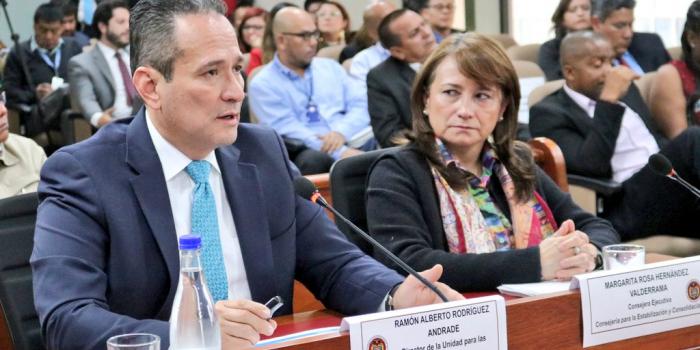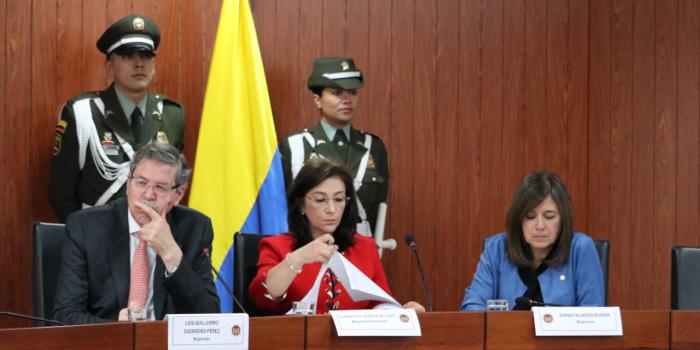
Technical session to follow up on sentence due to forced displacement
The Unit for Victims participated in the Technical Session following up on Judgment T-025 of 2004. The unit's director, Ramón Rodríguez, presented the progress made in compliance with the Constitutional Court ruling on forced displacement in six Country departments


In compliance with the follow-up of Judgment T-025 of 2004, which was issued by the Constitutional Court, who declared the existence of a “State of Unconstitutional Things” in matters of forced displacement, the director of the Victims Unit, Ramón Rodríguez, participated in the technical session, in which he related the work that the entity has been doing with the communities affected by this scourge.
“We seek articulation and mainly in six departments, the follow-up of ethnic approaches, Afro approaches, in care, assistance and return and relocation processes is what the Court wants to know today. We come to tell you what has been done in these communities that are in these six departments and that have been attended by the Unit in each of these components”, explained the official.
During the meeting, which analyzed the humanitarian and risk situation in which the population is in the Pacific regions (Costa and Nariño border, northern Cauca, Buenaventura and Chocó) and eastern Colombia (Meta and Guaviare), the Victims Unit established that a total of 72 humanitarian emergencies have been identified between January 2018 and July 2019; 49 of them correspond to massive displacements and 23 to confinements, product of the delicate situation of public order in these territories.
During this period the entity made subsidiary support to territorial entities in food and temporary housing components for a value close to five billion pesos. In addition to this, 6,802 households were served, corresponding to 80 percent of the ethnic population.
The Victims Unit has worked permanently to restore the rights of ethnic and non-ethnic communities in the so-called Pacific Corridor. Juan Orlando Pantoja Cuero, representative of the displaced population of the Middle Pacific (Subregion of the Pacific Cauca), pointed out some of the risk factors that hinder the actions of the State in these areas of the country: “What it somehow generates is an issue of greater risks for the exercise of our own as an ethnic group, which implies that in many cases we mobilize through the territory so that people raise the profile of inclusion in the defense of rights, but when armed actors are conditions change because the communities are unable in high proportions to be able to get together and somehow fulfill the role of government and their own authority”.
In Chocó, the Unit supported families returned to the Catru, Dubaza and Ancozo guards, with agricultural strengthening; In Valle del Cauca, materials were delivered for the construction of the ceremonial house of indigenous community of Chachajo, in the Chamapuro shelter.
In the departments of Meta and Guaviare, the entity provided support to the Jiw people with the attention of 826 households with deliveries exceeding 2,700 million pesos. The director of the Victims Unit, Ramón Rodríguez said that, “the entity continues to work for attention if humanitarian emergencies occur, but we know of the progress they have made in San José del Guaviare and especially in that border area between Meta and Guaviare and we want to promote the return processes”.
During the technical session the Office of the Ombudsman requested more resources for the Victims Unit to address these emergencies. “If we do not put the resources to the victims, it will be very difficult to be able to comply, so on August 6, the comptroller, attorney and the defender will present to the National Government some recommendations to be able to comply with the victims, and if we do not comply to the victims this country will continue without peace”, said Carlos Negret, Ombudsman.
The Victims Unit continues with its role as the main humanitarian actor in the country, guaranteeing the right of return and relocation of all victims affected by the Colombian armed conflict.
This technical session was attended by seven leaders from these communities; three from the North Pacific region, two leaders from the Middle Pacific region, a representative from the South Pacific region and a representative from the jiw people.
(End/FMB/LMY)






